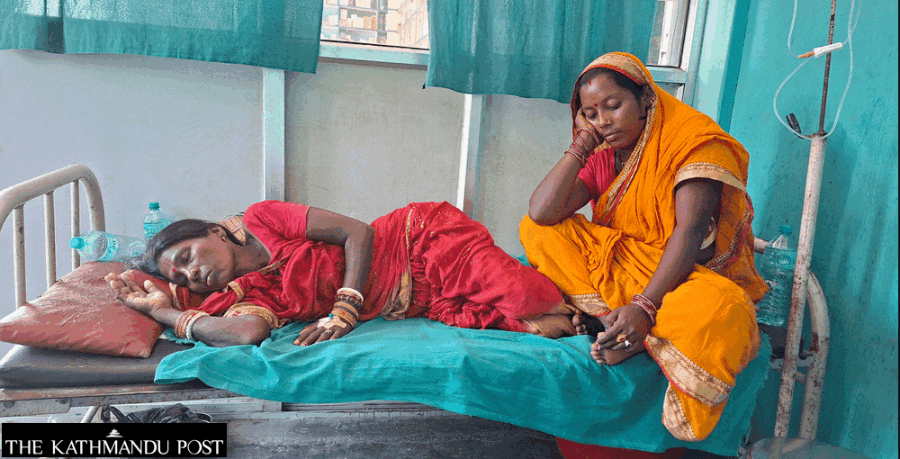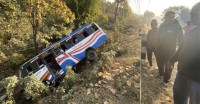National
Dalit family in Siraha brutally assaulted after neighbours’ repeated threats
Fifty-year-old woman lies bruised in Siraha hospital as family recounts years of insults, exclusion, and harassment.
Binay Aazad
Fifty-year-old Sumitra Mallik lies in a small clinic in ward 10 of Sukhipur Municipality, her body covered with dark bruises from head to toe. She can barely speak, but when a reporter visited her on Thursday, she struggled to whisper: “What can I say? For them, we are not even human.”
The assault that left her hospitalised took place on Wednesday morning, when members of her family tried to clear bushes in front of their home. What began as an everyday household chore quickly spiralled into violence. Neighbours accused them of attempting to encroach on land and attacked them mercilessly.
According to her daughter, 28-year-old Rina Mallik, the attackers included locals Sahadev Mahato, Sukdev Mahato, Nagendra Mahato, Dukharan Mahato, Rina Mahato, and Shyam Sundar Mahato. “They surrounded us and started beating without listening,” she said, recalling the moment when her mother collapsed under the blows. Her brother-in-law, Sanjay Mallik, was also injured, though he was discharged after receiving primary treatment. Sumitra, however, remains bedridden, weak and traumatised.
The Mallik family, who belong to the Dom community—a Dalit caste long stigmatised as untouchable—have been living on the banks of the Gagan Khola for the past 15 years. They had earlier resided in ward 13 of Golbazar Municipality, but caste-based abuse there had driven them away. They had moved to the riverbank at a time when the area was still sparsely populated, hoping for some peace. But as the market expanded and more households settled nearby, hostility returned. For years, the family has been subjected to harassment and exclusion. Sumitra’s husband, 58-year-old Ganapati Mallik, recounted how their neighbours insult them regularly.
“They say if they see a Dom face in the morning, their day is ruined. Sometimes they say our presence spoils their prayers, sometimes they claim we spread a stench. We have endured this cruelty for years. Their only aim is to drive us out,” he said.
Ganapati believes the harassment has taken many forms. About four years ago, he lost 18 pigs overnight. “We are convinced they were poisoned, but we had no proof. We cried silently and let it go, fearing conflict,” he said. Last year, the neighbours stopped the family from using water from a shared hand pump [shallow tubewell]. “We had no option but to drink river water for weeks. It made us sick. Finally, we installed our own pump. Their message was clear—they do not want us here,” Ganapati said bitterly.
Local officials are aware of the family’s plight. Devnarayan Yadav, the ward 10 chair, admitted that the Dalit family has been targeted repeatedly. “They have faced both verbal and physical abuse—sometimes sewage or wastewater was deliberately directed towards their home, other times direct threats were made. Such acts are deeply wrong and unacceptable,” he said. The accused, however, reject allegations of caste-based discrimination.
Dukharan Mahato, one of the alleged attackers, claimed the conflict is about land.
“The road they use is part of our private property. The problem is not caste, it is encroachment,” he said. Yet the Malliks insist the insults, threats, and exclusion clearly show otherwise. “If it was about land, why call us untouchables every time? Why stop us from drinking water [from the common tubewell]?” Ganapati asked.
The family filed a formal complaint with the District Police Office in Siraha on Wednesday, but no action has been taken so far. District police chief SP Anantaram Sharma confirmed that the case is under review. “They submitted a complaint yesterday. We are assessing the situation. It appears to be a long-standing dispute between neighbours. We will look into it carefully,” he told the Post on Thursday. For the family, the absence of swift police action is deeply discouraging. “Every time we go to the authorities, they tell us to settle it quietly. But how can we? This is our dignity and survival at stake,” said Rina, exhausted after two sleepless nights caring for her mother.
Incidents like this are not isolated in Nepal. Across Madhesh Province and beyond, Dalit families continue to face systemic discrimination despite constitutional guarantees of equality. Although laws criminalising untouchability exist, enforcement remains weak. In recent years, several cases have highlighted the persistence of caste-based violence: Dalit homes demolished ahead of religious events, inter-caste marriages sparking violent retaliation, and Dalit families displaced from their villages. Human rights activists say the issue lies not only in the acts themselves but also in the state’s failure to ensure accountability. “When Dalits complain, the police delay or downplay their cases. This emboldens perpetrators and discourages victims,” said advocate Kabuli Paswan.
For the Malliks, leaving is no longer an option. “We already left Golbazar because of this same problem. If we keep running, where will we go?” Ganapati said. “This is public land. We have lived here for 15 years. Now we are not going anywhere.” From her hospital bed, Sumitra nodded faintly as her husband spoke. Her voice was frail but her words were clear: “We only want to live with dignity, like other human beings.”
Until decisive action is taken, their struggle continues. The bruises on Sumitra’s body may fade with time, but the scars of humiliation and exclusion run far deeper, reflecting a reality faced by many Dalit families across the country.




 22.11°C Kathmandu
22.11°C Kathmandu














